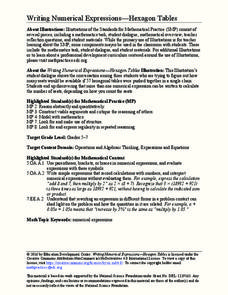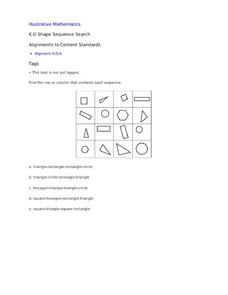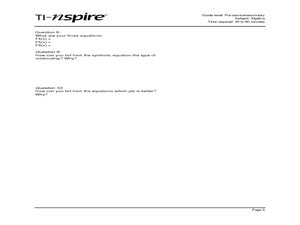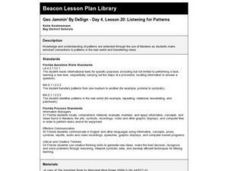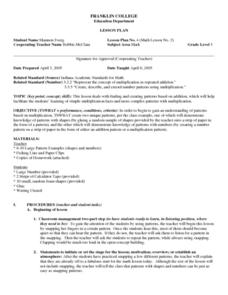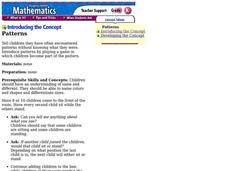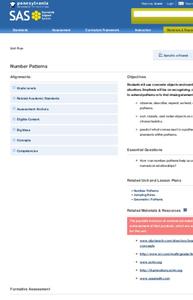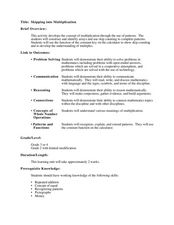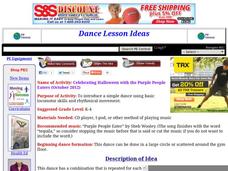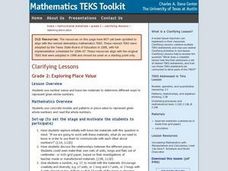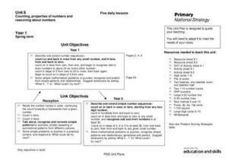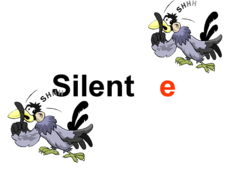Education Development Center
Writing Numerical Expressions—Hexagon Tables
Explore a basic pattern to practice writing expressions. In collaborative groups, learners examine a contextual pattern and write an expression to model it. The task encourages groups to describe the pattern in multiple ways.
Illustrative Mathematics
Shape Sequence Search
Learning that size and orientation don't affect the classification of shapes is a big step for young mathematicians. Support children with developing this key understanding by looking at the array of shapes included in this resource. For...
Curated OER
TI-Nspire Activity: What Does Your Representation Tell You?
By learning to select the best representation for three meal plans, students compare three meal plans to determine the best choice. Data for the meal plans is sorted on a table, as an algebraic equation, and graphed on a coordinate grid....
Curated OER
Geo Jammin' By Design: Listening for Patterns
Students listen to the teacher read a book and participate with guided questions. They discuss patterns and how they repeat, by looking at quilts. They design their own quilt block to create a class quilt.
Curated OER
The Water Cycle: A Repeating Pattern in Nature
Students are introduced to the terms related to the water cycle in their native language. In groups, they describe the steps of the cycle using different materials found in their art classroom. They describe how energy helps water...
Curated OER
Pattern Using Unit Cells
Students explore the pattern of the unit cell. In this science lesson, students color the unit cells on a worksheet and create a pattern using unit cells.
Curated OER
Finding and Creating Addition Patterns
Third graders listen as teacher snaps her fingers in a certain pattern and then join in as they become familiar with the pattern and then repeating it. They observe a patterns of shapes and repeat after the teacher has explained it....
Curated OER
Translating Patterns
In this worksheet, students examine picture patterns which have blank boxes beneath each picture. Students translate the pattern by coloring the boxes. Example: rose, rose, bird, rose, rose. (red, red, blue, red, red).
Curated OER
Patterns
Students make patterns. In this early sequencing lesson, students observe and state a pattern when they see one. The teacher begins be using students to demonstrate a pattern with half of the children standing and every other child sitting.
Curated OER
Rescue the Pattern
Students describe a wide variety of patterns. They extend a wide variety of patterns. Students write rules for a wide variety of patterns. Students represent, analyze, and generalize a variety of patterns with tables, graphs, and words.
Curated OER
Two Part Patterns
Students stand in a boy-girl-boy-girl pattern to demonstrate what a pattern might be. They separate into groups and create two part patterns using construction paper of different colors.
Curated OER
Number Patterns
First graders use manipulatives to complete and extend patterns. In this patterns lesson, 1st graders complete a pattern with a missing element, extend a pattern, and sort objects by characteristics.
Curated OER
Number Patterns
Students discover patterns in sets of whole numbers using calculators. They write journal entries and orally report their findings to the class. They look for primes, squares, cubes and multiples.
Curated OER
Number Patterns and Sequences
In this number patterns and sequences worksheets, students complete activities for number patterns and sequences including Fibonacci's Sequence, lines, regular polygons, and towers. Students complete 15 problems.
Curated OER
Skipping Into Multiplication
Young mathematicians study the relationship between skip counting and multiplication. They build on skip counting skills and examine arrays while studying multiplication. Resources are provided.
Curated OER
Celebrating Halloween With the Purple People Eaters
Get youngsters moving by teaching them some basic dance moves. This dance can be done in a circle, a line, or scattered around the gym. There are four movement combinations that are taught to the song "Purple People Eater" by Sheb...
Curated OER
Grade 2: Exploring Place Value
Creative problem solving is fun and helps kids conceptualize content. They use grid paper, manilla paper, and markers to cut, draw, and show given double-digit numbers as many ways as they can.
Curated OER
Counting, Properties of Numbers, and Reasoning about Numbers
Five days of lessons develop number sense and counting patterns, including odd and even numbers, 5s and 10s, doubles, and ways to make 10. Each session opens with fun finger play to reinforce counting and reasoning about numbers. Various...
Illustrative Mathematics
Kitchen Floor Tiles
An interesting way to look at the kitchen floor is to count the number of tiles in the border. Fred starts with four white floor tiles and writes an expression for the number of tiles needed for the colored border. Algebra learners are...
EngageNY
Algebraic Expressions—The Distributive Property
Do your classes truly understand the distributive property? Use a demonstrative lesson to represent the distributive property in various ways. Learners solidify understanding by creating a geometric pattern for distributive property, and...
Teach Engineering
Bubbles and Biosensors
Bubbles aren't just for children. In the third installment of a seven-part series, teenagers use bubble solution to create bubbles and observe patterns of refraction on the bubble surfaces. Application of this concept to thin films in...
EngageNY
Numbers in Exponential Form Raised to a Power
Develop an understanding of the properties of exponents through this series of activities. This third lesson of 15 explores the patterns associated with the power property. Scholars expand the powers before applying the property.
Curated OER
Silent "e"
Large font and colorful images allow your students to study words including the silent "e". There are a total of nine words on separate slides with the consonants and vowels typed in different colors. Tip: While reading the words out...
Curated OER
Weaving a Story
It's time to investigate patterns! First and second graders construct a paper weaving using a hundreds chart, then use the Ti-10 calculator to make patterns such as adding 3 each time. Learners remove multiples of three from the hundreds...
Other popular searches
- Repeating Patterns in Shapes
- Repeating Patterns Art
- Math Repeating Patterns
- Repeating Patterns Poetry
- Repeating Patterns Science
- Repeating Patterns in Math
- Repeating Patterns in Music
- Growing and Repeating Patterns


